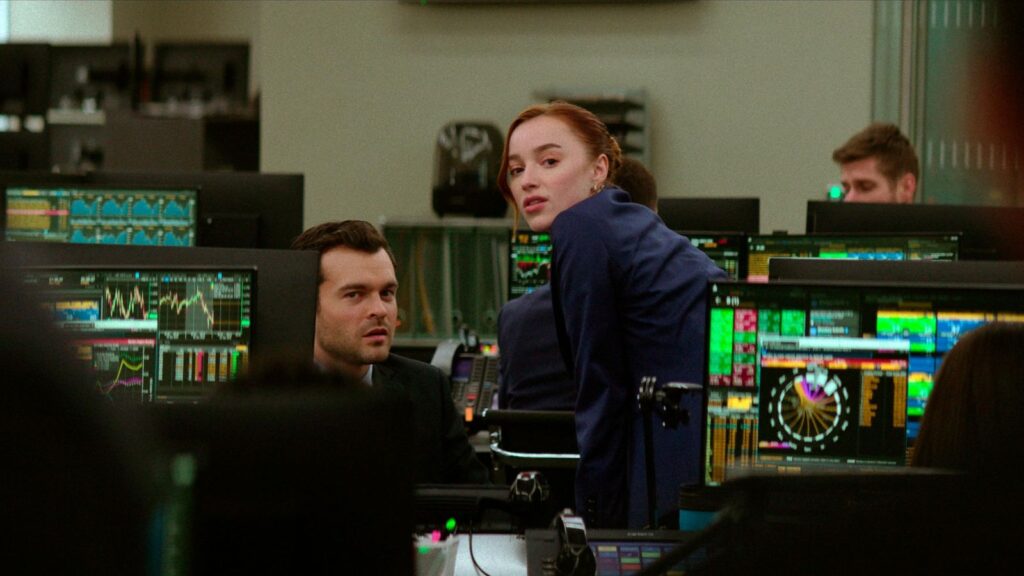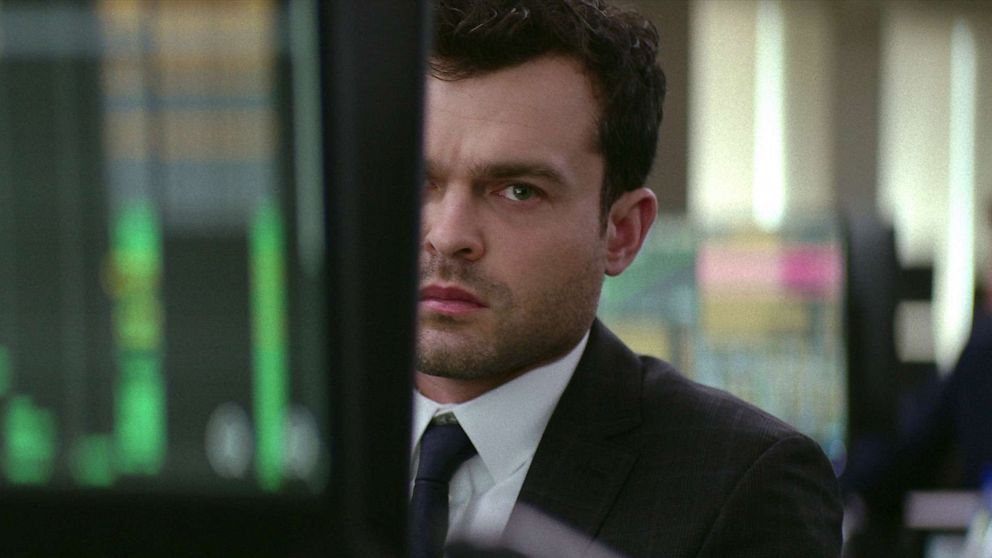
The power couple at the center of Fair Play both work at a pressure-cooker investment bank, so it’s fitting that the movie opens with its own form of aggressive sales pitch. Emily (Phoebe Dynevor) and Luke (Alden Ehrenreich) are cavorting at a wedding, where they sneak into the bathroom for a quickie. Luke performs some moan-inducing cunnilingus, but Emily’s gasps turn from pleasure to shock when she realizes that her menstruation has bloodied both his face and her dress. Yet they recover their poise (“You look like you slaughtered a chicken,” he giggles), then sneak out a back door and race home to their swanky Manhattan apartment, where they enthusiastically finish what they’d started.
The purpose of this introduction is twofold. On a character level, it’s designed to establish Luke and Emily’s mutual passion—an ardor whose strength and durability will be tested as the film unspools. And in terms of style and imagery, it announces its provocative intent—not as a product of pornography (the simulated thrusting and the glimpses of nudity are more coy than explicit), but as a piece of proudly sexed-up entertainment. Here at last, writer-director Chloe Domont proclaims, is an adult movie for adult audiences.
At the risk of deploying the finance-adjacent jargon that buzzes about the screenplay’s periphery (Quantitative easing! Zero-interest-rate policies!), I must accuse Domont of selling her viewers a bill of goods. Fair Play, for all its putative transgression and performative intensity, is a fundamentally childish picture, one that mistakes contrivance for complexity and crudity for maturity. Yet it isn’t bereft of pleasure or intelligence; buried beneath its fraudulent posturing lie intriguing thematic questions about modern gender roles, in both romance and the workplace. Its stock price climbs steadily, until it crashes.

Fair Play may envision itself as kinky—when Luke spurns her offer of late-night sex, Emily pouts, “I guess I’ll just have to lie here and fuck myself”—but its knottiest tangle is that between its characters’ personal and professional lives. Emily and Luke both toil as analysts at the same hedge fund, where they keep their engagement incognito in order to avoid running afoul of the company’s protocol forbidding intra-office romance. They seem to enjoy the subterfuge—trading sly glances in the elevator, exchanging whispers by the coffeemaker—and things only appear bound to improve once Emily informs Luke of the gossip she overheard that he’s destined for a promotion. (A coveted office is vacant following an amusing sequence in which a fired employee takes a golf club to his desk.) But then, in the first and most credible of the plot’s many twists, Emily fields a late-night call from her superior (an oddly unpersuasive Eddie Marsan) and learns that she, not Luke, has landed the gig.
The ensuing scene in which Emily gently breaks this news to Luke is the linchpin of the movie, and Domont choreographs it adroitly. After a fleeting but crucial instant of hesitation, Luke reacts as any loyal and supportive fiancé would; he tells Emily he’s proud of her, and he insists that this development won’t cause any friction at work or at home. The remainder of Fair Play is devoted to putting the lie to Luke’s supposed reassurance while also exploring if he ever meant it in the first place.

As a portrait of the high-octane financial industry, Fair Play is unconvincing; it ignores the banality of economic markets in favor of an oversimplified game of chaos in which every single trade has million-dollar ramifications. (The same is generally true of Industry, the underrated Max series that wields its hedge-fund ostentation as camouflage for a searching study of sexual mayhem and workplace dynamics.) But despite its sleekly appointed interiors and its periodic fiscal babble, the movie’s setting is largely irrelevant to its ideas; Luke and Emily could work in any high-stress environment, and they would be just as vulnerable to the tensions that inevitably flare between them.
Which are both obvious and absorbing. Emily’s ascent of the corporate ladder doesn’t just mean greater pressure and responsibility; it also requires her to assimilate into a boys’ club, with its attendant codes and rituals. Does her chaste wardrobe befit that of a mighty executive? When her colleague playfully suggests that they celebrate a big win at a strip club, is he just kidding, or is she expected to embrace misogynistic debauchery? And can she treat Luke as a subordinate in the office while still respecting him as a romantic partner?

For his part, Luke faces his own set of pressing and nettlesome questions, which are less institutional than personal. Just why did Emily receive that promotion when she’d initially thought it was ticketed for him? Might those vulgar rumors that she separated herself from the pack by spreading her legs be rooted in a kernel of truth? Doesn’t she at least owe him the courtesy of recommending him for similar advancement, given how chivalrous he’s been?
You might glean from my framing that these two sets of inquiries aren’t symmetrical; Emily’s ability to swim in her newfound managerial waters requires delicacy and dexterity, and her task is only made more difficult as Luke’s behavior grows increasingly erratic. (After he signs up for a self-help leadership seminar, he starts speaking in ludicrous aphorisms, e.g., “Set rules to live by or they’ll become his rules to die by.”) One of the challenges for Domont is to articulate her feminist bona fides while still affording depth to both of her lead characters. She leans hard on her actors, with acceptable results. Dynevor, no stranger to overheated sex scenes following her run on Bridgerton, conveys Emily’s persistent intelligence alongside her mounting frustration. As for Ehrenreich, he allows Luke’s self-absorption to build incrementally, pretending to be an evolved specimen of noble masculinity before gradually revealing himself as a complete weasel.

Unfortunately, Fair Play’s screenplay abandons this sense of nuance, instead devolving into hacky conflicts and garish violence. Part of the problem is that Luke and Emily’s relationship, ostensibly the foundation for the movie’s turmoil, never feels rooted in true connection. “We need to fuck,” Emily says at one point in an effort to jolt them from their malaise, but while the concept of couples using sex to restore their intimacy is sensible, here it comes across as stiff (or not!) and artificial. Despite the actors’ breathy pantomimes of desire and agitation, there is no real heat between them, and their lack of intimacy scans less as a consequence of Emily’s promotion than as evidence that their romance was phony from the start.
If the opening act of Fair Play is promising, its concluding passages are disastrous, as Domont feebly tries to transform a thorny drama into a scandalizing thriller, complete with bruised bodies, anguished screams, and bloody knives. I’m generally loath to allow a movie’s crappy ending to invalidate its prior merits, so I’ll acknowledge that Domont’s feature debut contains some thoughtful ideas. But maybe I’ve been corrupted by its coarse view of asset management, which proves prophetic as well as simplistic. No matter how many modest gains you make, it only takes one bad decision to tank the whole damn thing.
Grade: C+
Jeremy Beck is the editor-in-chief of MovieManifesto. He watches more movies and television than he probably should.
